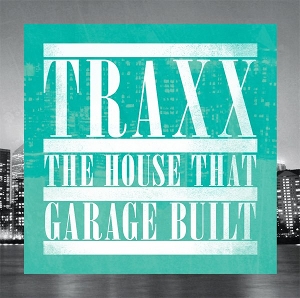Various Artists Traxx: The House That Garage Built
It’s a daunting task to try and track the permutations of garage that have appeared […]

It’s a daunting task to try and track the permutations of garage that have appeared during the past two decades, from early-’90s pitch-shifted pop vocals to the post-millennial snarl of grimy 2-step textures. 2013 finds UK label Needwant taking a shot at recording the latest iteration of the genre with its 16-track compilation, Traxx: The House That Garage Built, a collection that harkens back to the sound’s New York and New Jersey roots while taking subtle cues from the worlds of dubstep, techno, and house.
HNNY‘s “For the Very First Time” sets the scene nicely, sporting ’90s New Jersey-style organs and a swinging bassline thump that owes Kerri Chandler a royalty check or two. The song bleeds into Harry Wolfman‘s tactfully paced remix of Ben Pearce‘s “What I Might Do,” a production ripe with synth dollops that updates the source material in satiating fashion while leaving its sampled vocal bits largely intact. It may not be much of a departure from Pearce’s original, but there appears to be no effort to reinvent the wheel here, a trend that continues throughout Traxx.
The compilation covers its fair share of familiar ground, most notably via the inclusion of some of 2012’s biggest garage-house anthems, including Dusky‘s “Flo Jam,” the Medlar remix of Disclosure‘s “Boiling,” and the NY Stomp remix of George Fitzgerald‘s “Child.” Granted, these tracks have all become floor favorites for good reason, but it doesn’t take long for similarities between them to become clear—there are more than enough breathy vocals fluttering over organ-grinder basslines. At the same time, Ejeca‘s “Horizon,” a song which has received plenty of rinses since its release last year, still sounds invigorating and retains the buzzing charisma of early-’90s MK dubs, even after repeated plays.
Traxx is at its most compelling when it’s showcasing newly emerging artists. The Real Connoisseur‘s hypnotizing “Faux De Beaux” is perhaps the album’s best example of how a classic garage aesthetic can be merged with stuttering bass manipulation. Rhythm Operator‘s “Anytime” also stands out, as it offers up a dreamy, clanking percussive pattern, perhaps in tribute to Nu-Birth’s 1998 jam of the same name. In a similar nod to the past, Rhode & Brown & Mark Schegg‘s “Joyride” draws out a sustained synth note amongst ballooning bassline pulses; there’s such an unwavering dedication to early New York house that it calls into question what decade the track was produced in.
Though effortlessly propulsive from start to finish, Traxx‘s relative commitment to straightforward revivalism saps some of the energy that made garage such an unhinged—and fun—undertaking the first time around. Though it’s an alluring compilation for those looking to familiarize themselves with the interplay between vintage garage and contemporary house sounds, those already well versed in the malleable genre’s history may be left wanting more.

